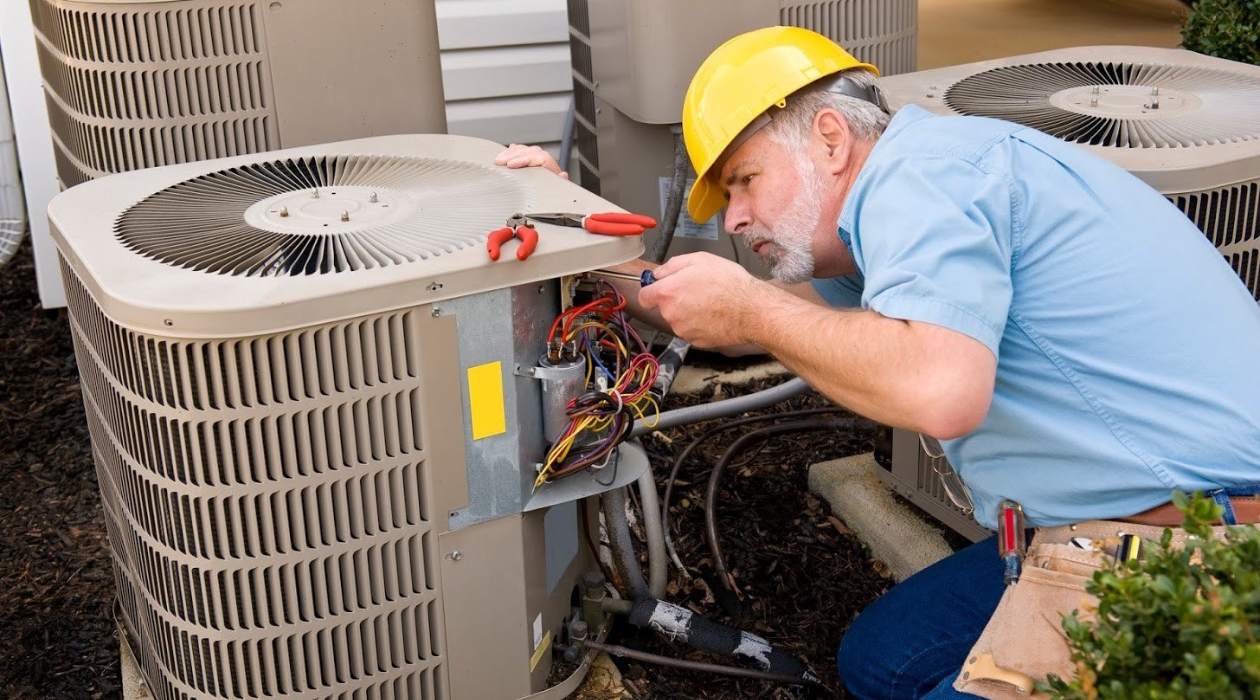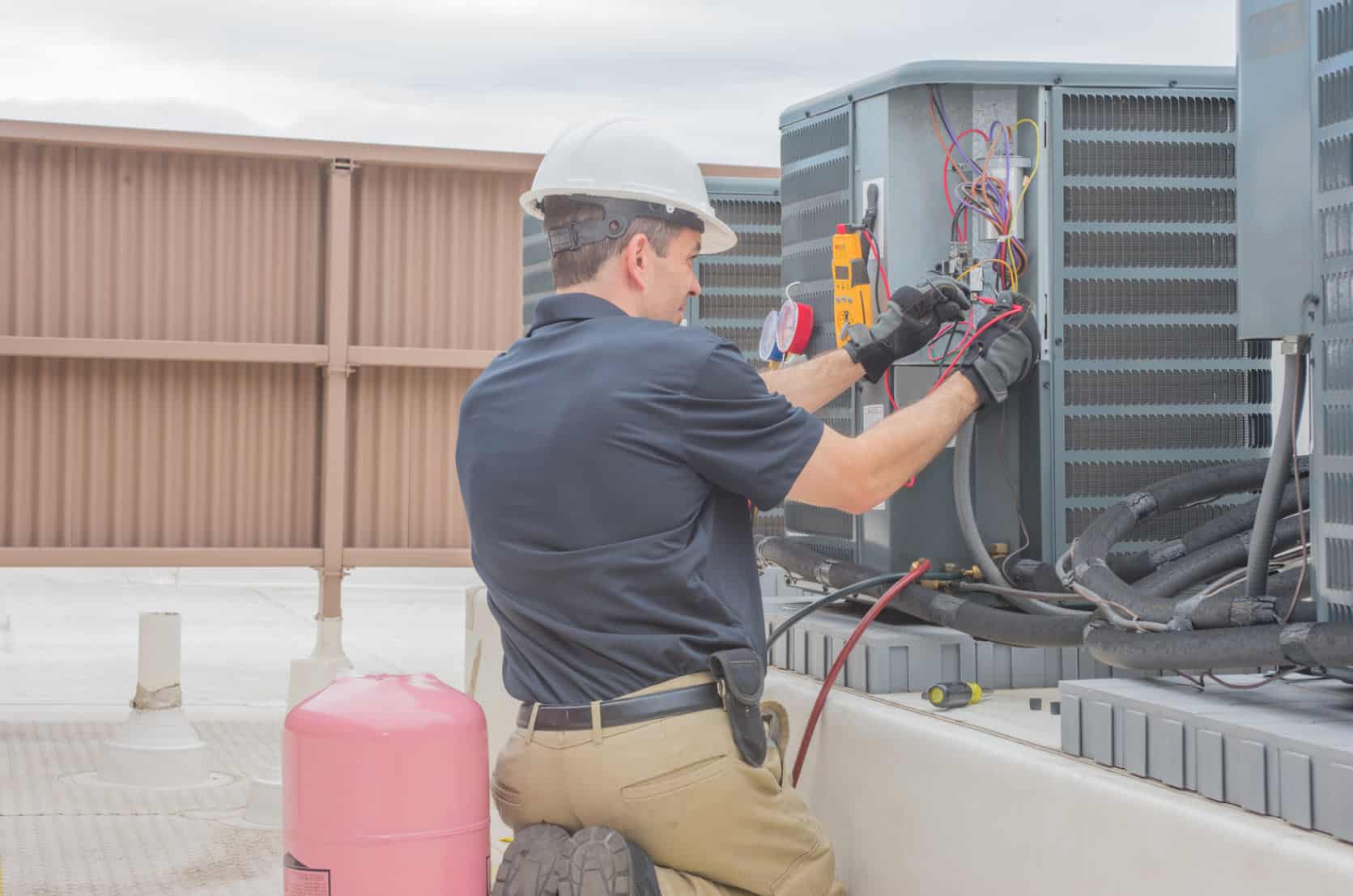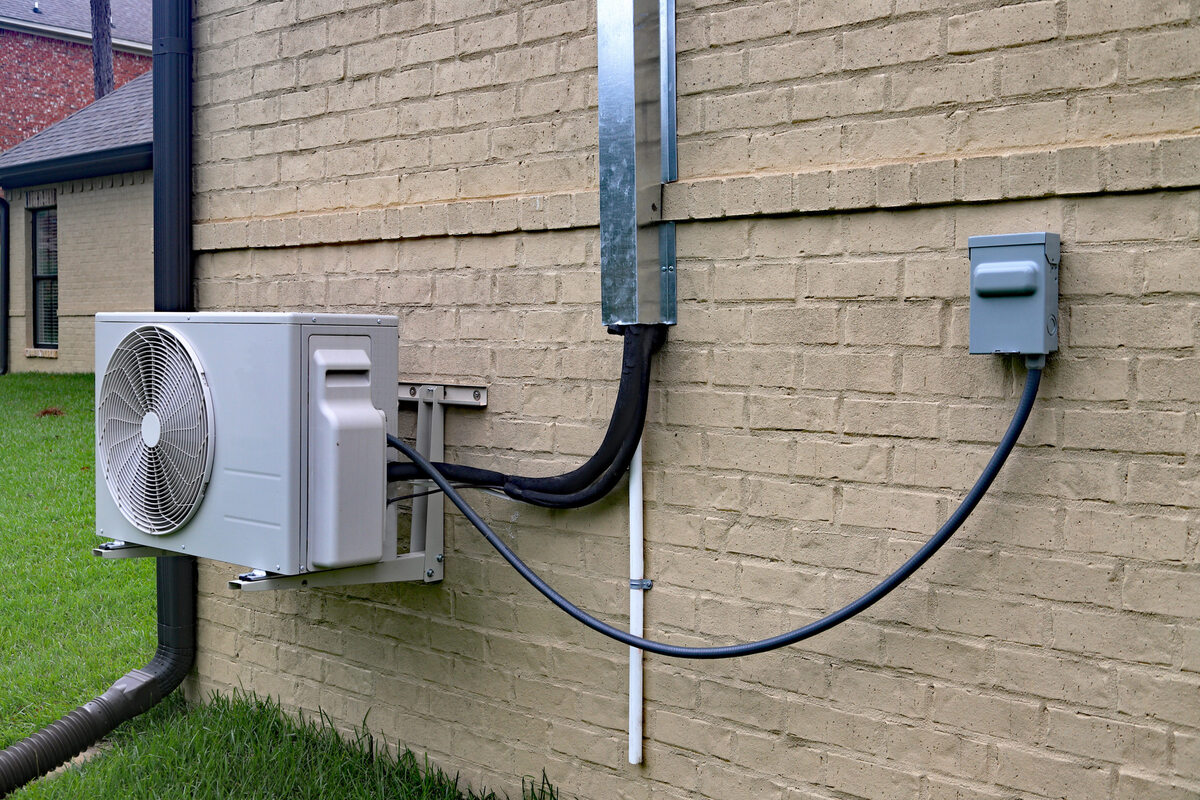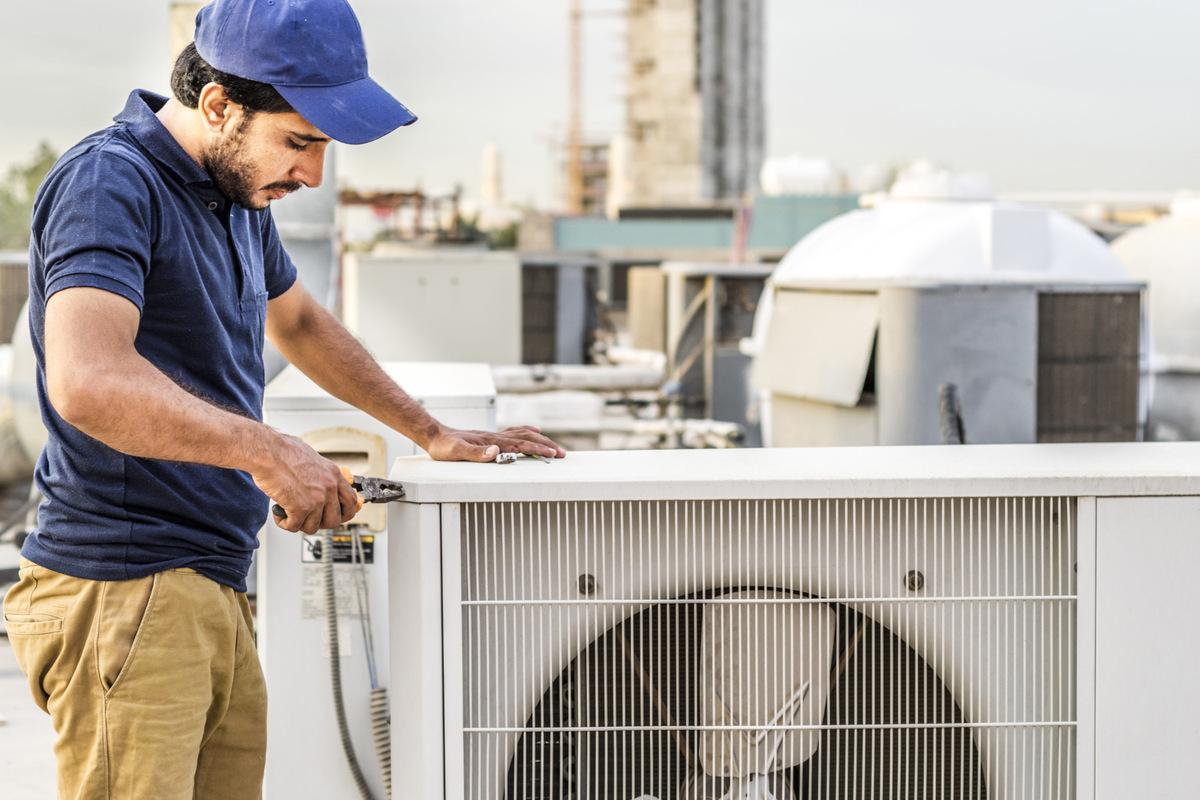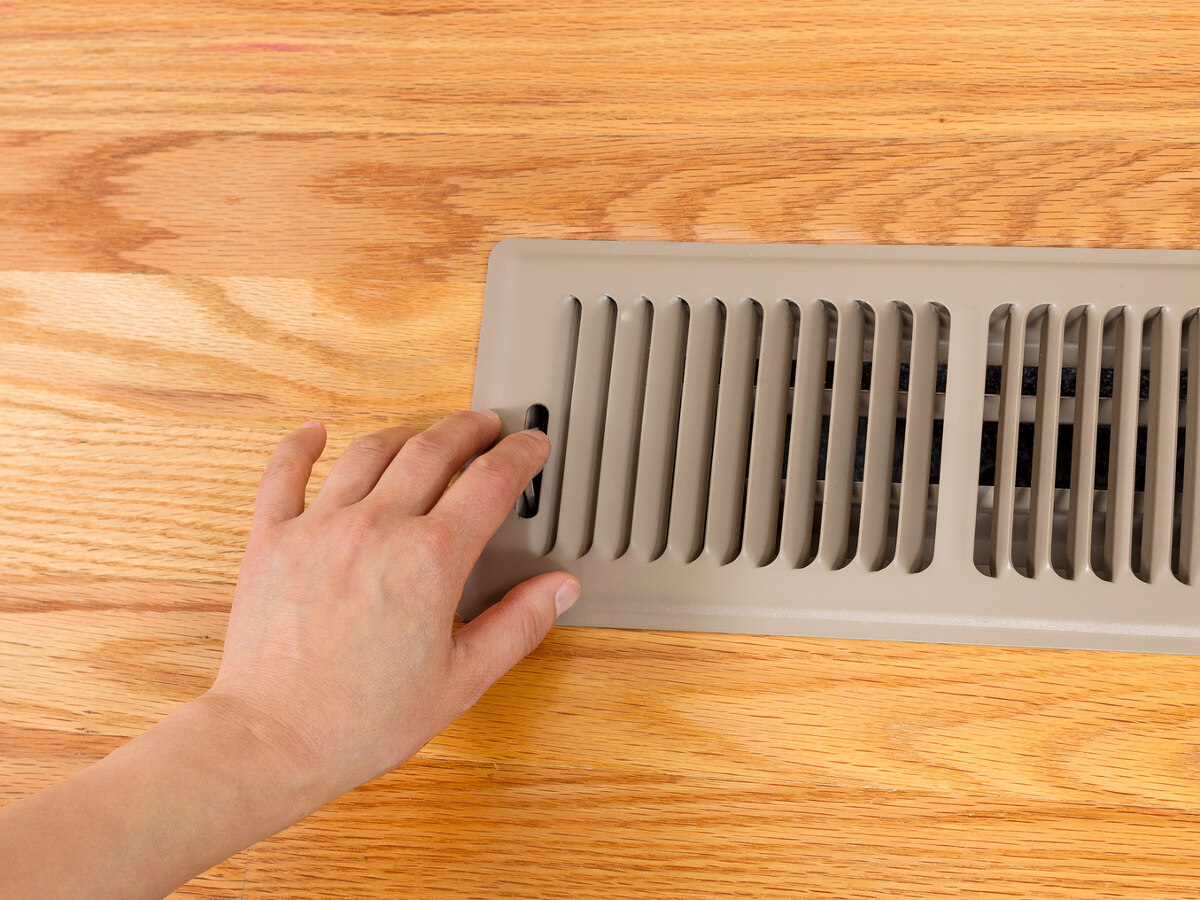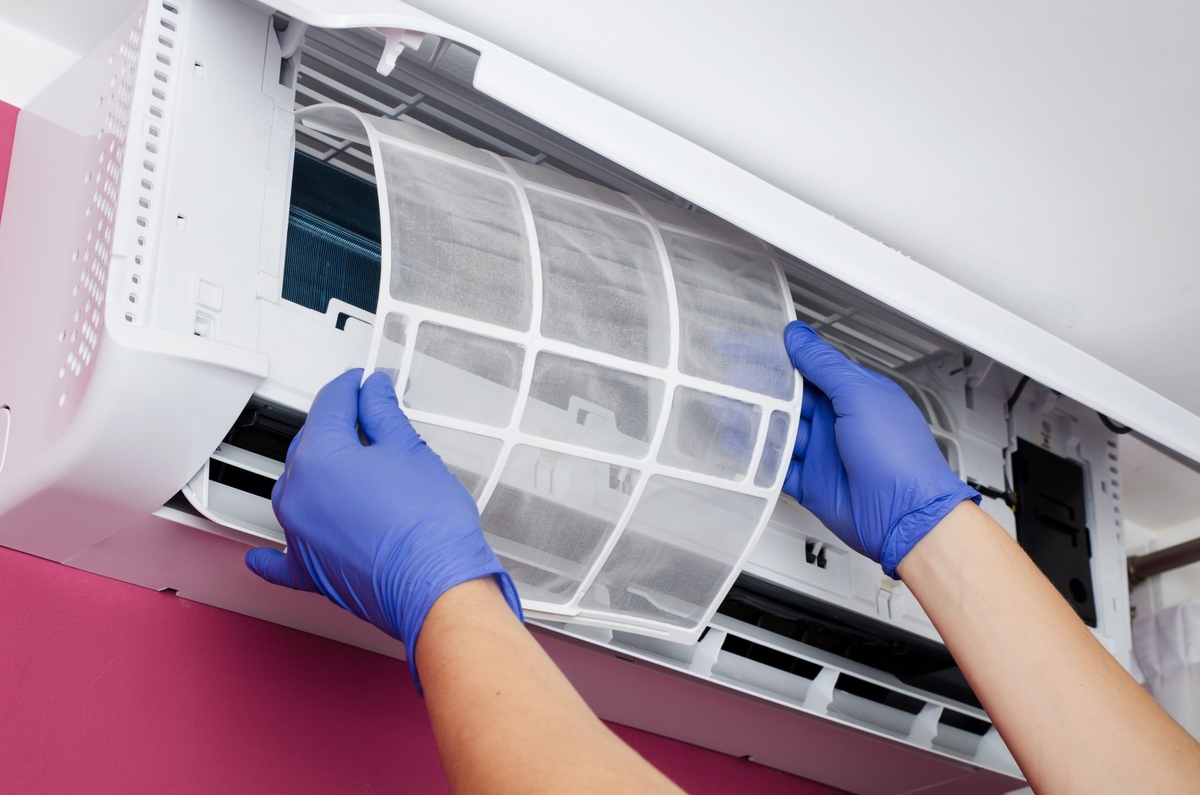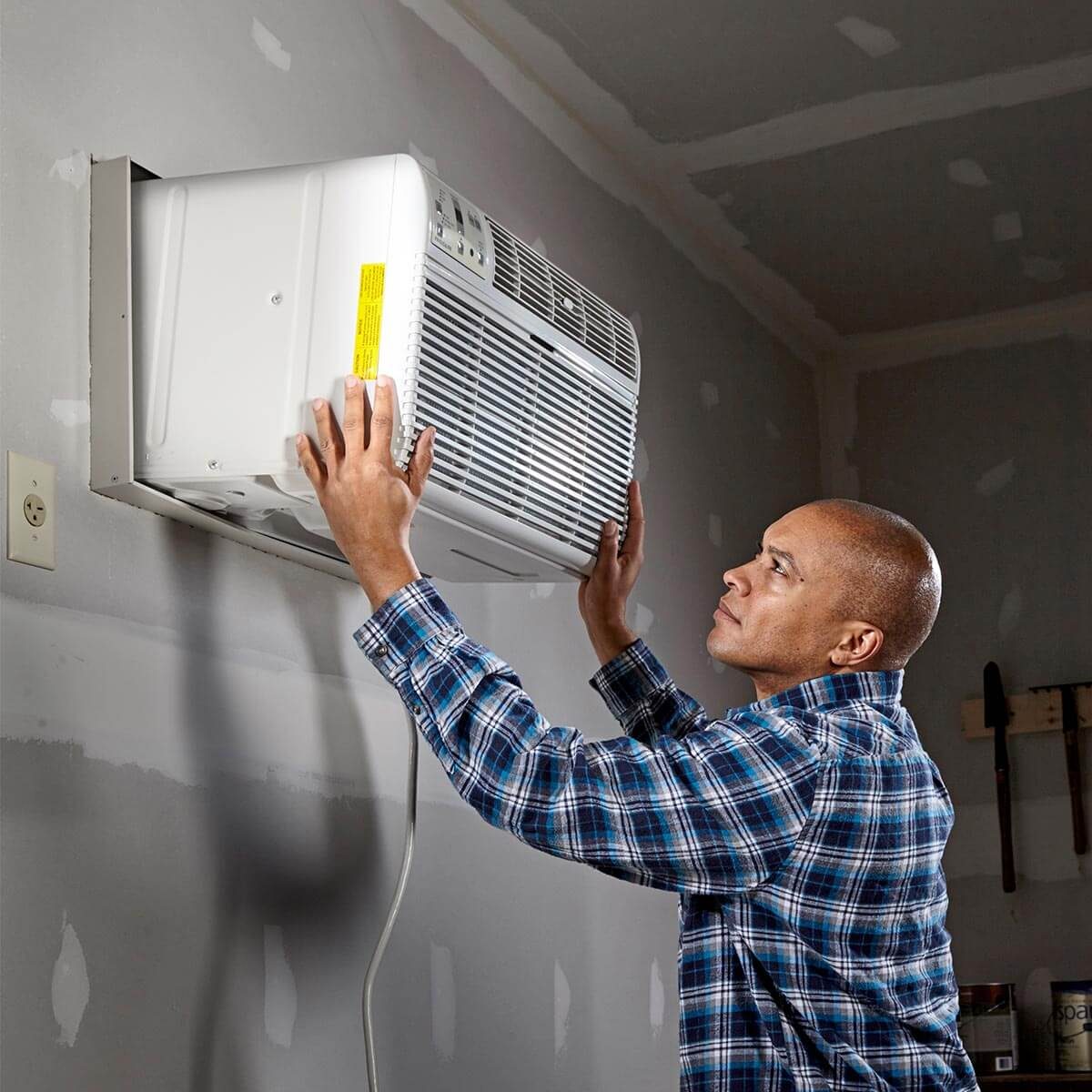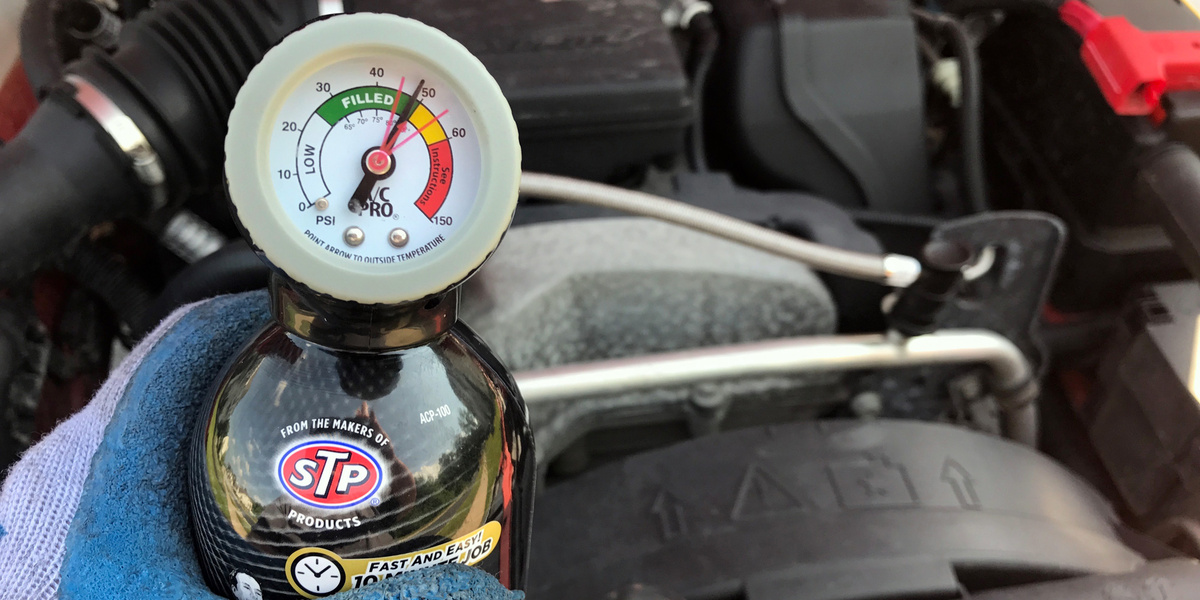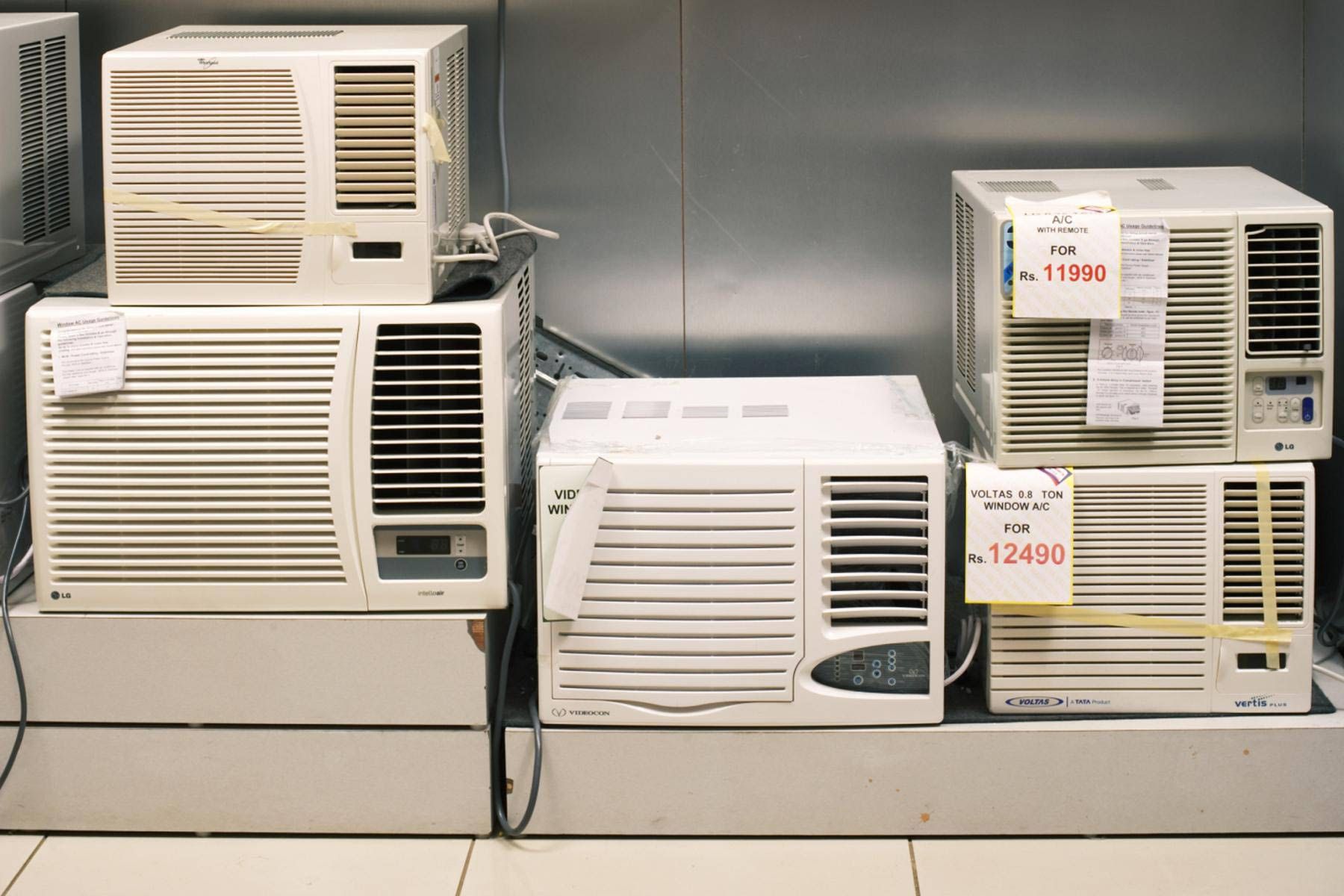Home>Home Maintenance>How To Become An Air Conditioning Technician
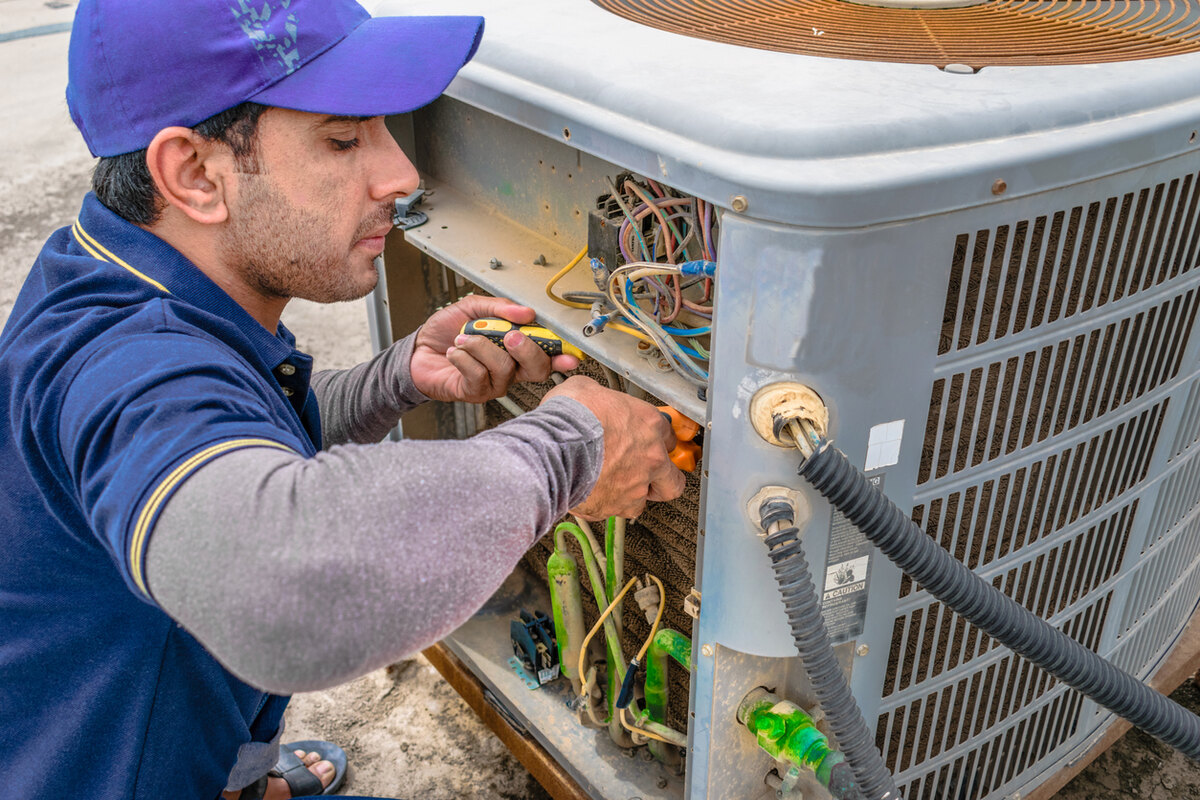

Home Maintenance
How To Become An Air Conditioning Technician
Modified: March 6, 2024
Learn how to become an air conditioning technician and master home maintenance skills. Start a rewarding career in HVAC with comprehensive training and hands-on experience.
(Many of the links in this article redirect to a specific reviewed product. Your purchase of these products through affiliate links helps to generate commission for Storables.com, at no extra cost. Learn more)
Introduction
Welcome to the world of air conditioning technicians! If you’re passionate about home maintenance and want to pursue a rewarding career, becoming an air conditioning technician may be the perfect fit for you. In this article, we will explore the education and training requirements, licensing and certifications, skills and qualifications, job duties and responsibilities, safety considerations, tools and equipment, troubleshooting and repair techniques, preventative maintenance, customer service skills, career outlook, and advancement opportunities in the field of air conditioning technology.
Air conditioning technicians, also known as HVAC (Heating, Ventilation, and Air Conditioning) technicians, play a crucial role in installing, maintaining, and repairing air conditioning systems in residential, commercial, and industrial settings. Their expertise ensures that buildings stay cool and comfortable, especially during the scorching summer months.
If you have a keen interest in mechanics, electrical systems, and problem-solving, a career as an air conditioning technician can be highly rewarding. Having a strong foundation in math and physics is beneficial, as it enables technicians to understand the complex concepts behind air conditioning systems.
In the following sections, we will delve into the specific requirements and skills needed to become an air conditioning technician. We will also explore the day-to-day responsibilities, the importance of safety and regulations, the tools and equipment used, common troubleshooting and repair techniques, the significance of preventative maintenance, the role of customer service skills, and the career outlook and advancement opportunities in this field.
Key Takeaways:
- Becoming an air conditioning technician requires a high school diploma, post-secondary education in HVAC, and continual learning. Strong technical skills, customer service, and safety knowledge are essential for success in this rewarding career.
- Air conditioning technicians play a crucial role in ensuring comfort and safety. The field offers promising job growth, opportunities for specialization, and a good work-life balance, making it an appealing career choice.
Read more: How To Become A BIM Technician
Education and Training Requirements
To become an air conditioning technician, a high school diploma or equivalent is typically required. However, some employers may prefer candidates with post-secondary education in HVAC technology or a related field. Completing a vocational or technical program in HVAC can provide a solid foundation and increase job prospects.
These programs usually cover subjects such as electrical systems, refrigeration principles, heating systems, ventilation, and air conditioning theory. Students gain hands-on experience through practical training, which helps them develop the necessary skills to install, diagnose, and repair air conditioning units.
After completing the education requirements, aspiring technicians often seek further training through apprenticeship programs or entry-level positions. Apprenticeships offer a combination of on-the-job training and classroom instruction, allowing individuals to learn from experienced professionals in the field. These programs typically last 3-5 years.
During the apprenticeship, technicians will work under the guidance of a licensed professional, gaining practical experience and improving their skills. They will also receive additional instruction on safety protocols, building codes, and industry standards.
While formal education and apprenticeships are valuable, it is essential for air conditioning technicians to have a strong foundation in both mechanical and electrical systems. This knowledge will allow them to understand the intricacies of air conditioning units and perform repairs and installations effectively.
Continuing education is also important in this field. As technology advances and systems become more complex, technicians need to stay updated on the latest industry trends, regulations, and repair techniques. Many manufacturers offer training programs and certifications to ensure technicians are proficient in working with their specific equipment.
In summary, while a high school diploma is the minimum requirement, pursuing post-secondary education in HVAC technology or completing an apprenticeship program is highly beneficial. Continual learning and staying up-to-date with industry advancements are also crucial for air conditioning technicians to excel in their careers.
Licensing and Certifications
Obtaining the appropriate licenses and certifications is an important step in becoming a qualified and reputable air conditioning technician. The requirements for licensure vary depending on the state or country in which you plan to work.
In many regions, air conditioning technicians are required to obtain a license to practice. This typically involves passing an exam that tests knowledge of HVAC systems, safety regulations, and local building codes. Some states have different levels of licensure, such as apprentice, journeyman, and master licenses, each with its own set of requirements and qualifications.
Additionally, many technicians choose to pursue voluntary certification to showcase their expertise and improve their job prospects. Organizations such as the North American Technician Excellence (NATE) and the Refrigeration Service Engineers Society (RSES) offer certification programs that assess a technician’s knowledge and skills in specific areas such as installation, service, and maintenance of air conditioning systems.
These certifications provide validation of a technician’s competence, and they can also potentially lead to higher-paying job opportunities. Obtaining certifications often involves passing an examination based on industry standards and best practices.
Continuing education is often required to maintain these certifications. Technicians must stay informed about the latest advancements in air conditioning technology, industry regulations, and safety practices. Renewing certifications typically involves completing a certain number of hours of continuing education or passing a recertification exam.
While licensing and certifications may not be mandatory in all areas, they provide a level of professionalism and expertise that can offer a competitive edge in the job market. Employers often prefer technicians who have obtained the necessary licensure and certifications, as it provides assurance of their knowledge and commitment to the field.
Ultimately, obtaining the appropriate licensure and certifications demonstrates that you have the necessary skills and knowledge to perform air conditioning services safely and effectively. It also shows your dedication to providing high-quality service to clients.
Skills and Qualifications
To succeed as an air conditioning technician, it is essential to possess a diverse set of skills and qualifications. In addition to technical expertise, certain personal qualities can contribute to an individual’s effectiveness and success in this field.
Here are some of the key skills and qualifications that air conditioning technicians should possess:
- Technical Knowledge: Air conditioning technicians must have a strong understanding of HVAC systems, including their components, functions, and operational principles. They should be familiar with various types of air conditioning units, such as window units, split systems, and central air conditioning systems. Knowledge of electrical systems, refrigeration, and troubleshooting techniques is also crucial.
- Problem-Solving Skills: Air conditioning technicians encounter various challenges in their work, such as diagnosing malfunctions, identifying repair needs, and finding solutions to complex issues. The ability to analyze problems, think critically, and come up with effective solutions is essential in this field.
- Attention to Detail: Precise and accurate work is crucial in air conditioning installations and repairs. Technicians must pay close attention to details to ensure that systems are properly installed, components are connected correctly, and there are no leaks or potential hazards.
- Physical Fitness: Air conditioning technicians often work in physically demanding environments and need to be capable of lifting heavy equipment, climbing ladders, and working in cramped spaces. Good physical fitness and stamina are important to perform tasks effectively and avoid workplace accidents.
- Communication Skills: Effective communication is key when interacting with clients, colleagues, and supervisors. Technicians should be able to explain complex technical concepts in simple terms, actively listen to customer concerns, and provide clear instructions or recommendations.
- Time Management: Air conditioning technicians often work on multiple projects or service calls simultaneously. The ability to prioritize tasks, manage time efficiently, and meet deadlines is essential to ensure timely completion of installations, repairs, and maintenance work.
- Customer Service: Providing exceptional customer service is crucial in any professional field. Air conditioning technicians should be friendly, approachable, and able to address customer needs and concerns professionally. Building good rapport with clients can lead to repeat business and positive word-of-mouth referrals.
- Attention to Safety: Working with electrical systems and refrigerants can pose potential hazards. Air conditioning technicians must prioritize safety at all times by adhering to industry regulations, wearing personal protective equipment (PPE), and following proper procedures for handling hazardous materials.
While formal education and training can teach the technical skills required for the job, developing and honing these personal qualities is equally important. Continuous improvement and a commitment to learning are essential for air conditioning technicians to stay abreast of industry advancements and deliver exceptional service to their clients.
Job Duties and Responsibilities
As an air conditioning technician, your primary responsibility is to install, maintain, and repair air conditioning systems. Your job duties can vary depending on the specific employer and the type of systems you work on. Here are some common job duties and responsibilities of an air conditioning technician:
- Installation: You will be responsible for installing new air conditioning systems, whether it’s a central air conditioning unit for a large building or a window unit for a residential property. This includes handling the necessary electrical connections, refrigerant lines, and ductwork.
- Maintenance and Repairs: Regular maintenance is vital to keep air conditioning systems functioning optimally. This involves inspecting, cleaning, and lubricating system components, checking refrigerant levels, and replacing worn-out parts. When systems break down or malfunction, technicians must diagnose the issue and perform the necessary repairs.
- Diagnostic Testing: Air conditioning technicians use various tools and equipment to diagnose system problems. This can include measuring airflow, testing electrical connections, checking for refrigerant leaks, and analyzing temperature variations to identify the root cause of issues.
- Replacing Components: As an air conditioning technician, you will frequently replace damaged or faulty components within air conditioning units. This can include compressors, coils, motors, fans, thermostats, and other parts that may wear out over time.
- Upgrades and Retrofitting: It is often necessary to upgrade or retrofit existing air conditioning systems to improve energy efficiency or comply with changing regulations. Technicians may need to replace older components, modify ductwork, or install additional controls or sensors.
- Documentation and Reporting: Air conditioning technicians are responsible for maintaining accurate records of their work, including installation details, diagnostics reports, and maintenance schedules. This documentation helps track maintenance history, identify recurring issues, and ensure legal compliance with relevant regulations.
- Customer Service: Interacting with customers is an essential part of the job. Technicians must be friendly, professional, and attentive to customer concerns. They should be able to explain technical details clearly, provide recommendations, and answer any questions or concerns the customer may have.
- Compliance with Safety Standards: Air conditioning technicians must adhere to safety protocols to protect themselves and others. This includes following proper procedures for handling refrigerants, wearing appropriate protective gear, and working in accordance with relevant safety regulations and industry standards.
As an air conditioning technician, you play a vital role in ensuring the comfort and well-being of individuals by maintaining and repairing air conditioning systems. Attention to detail, technical expertise, and effective communication skills are essential to perform these duties accurately and efficiently.
Read more: How To Become A Plumbing Technician
Safety and Regulations
Safety is paramount in the field of air conditioning technology due to the potential hazards associated with electrical systems and refrigerants. Adhering to safety protocols and following industry regulations is essential to protect technicians, clients, and the environment. Here are some of the key safety considerations and regulations that air conditioning technicians must adhere to:
- Refrigerant Handling: Air conditioning systems typically use refrigerants to cool the air. These substances can be hazardous if not handled properly. Technicians must be certified in the safe handling of refrigerants and follow guidelines set by organizations such as the Environmental Protection Agency (EPA). This includes proper storage, use of protective equipment, and correct disposal of refrigerants.
- Electrical Safety: Working with electrical systems poses a risk of electrical shock and other accidents. Technicians must be knowledgeable about electrical safety, including proper grounding, use of circuit breakers, and handling live wires. They should also follow local electrical codes and regulations to ensure installations and repairs meet safety standards.
- Personal Protective Equipment (PPE): Air conditioning technicians must wear appropriate personal protective equipment while working. This can include safety glasses, gloves, steel-toe boots, respirators, and other gear, depending on the specific tasks and potential hazards involved.
- Worksite Safety: Technicians should assess worksites for potential safety hazards before starting any work. This may include checking for exposed electrical wires, unstable surfaces, and proper ventilation. Keeping a clean and organized work area can also help prevent accidents.
- Compliance with Building Codes: Air conditioning technicians must comply with local building codes and regulations when installing or repairing systems. This ensures that the work meets safety standards, proper permits are obtained if required, and the systems are installed in a way that minimizes risks and potential violations.
- Product and Equipment Safety: Air conditioning technicians use various tools, equipment, and products during installations and repairs. It is important to ensure that these items are safe and approved for use. Following manufacturer’s guidelines and industry best practices ensures that technicians operate within safe parameters.
- Proper Ventilation: Air conditioning systems play a significant role in maintaining good indoor air quality. Technicians should ensure that ventilation is in compliance with standards to promote healthy air circulation and prevent the buildup of harmful gases or pollutants.
- Emergency and First Aid: Being prepared for emergencies is important. Technicians should possess basic first aid skills and be trained in CPR. They should also have an understanding of emergency procedures and have access to safety equipment such as fire extinguishers and first aid kits.
By prioritizing safety and following established regulations, air conditioning technicians can protect themselves, maintain the integrity of the systems they work on, and ensure the safety and satisfaction of their clients.
Consider enrolling in a technical school or apprenticeship program to gain hands-on experience and knowledge in air conditioning systems. This will provide you with the necessary skills and qualifications to become an air conditioning technician.
Tools and Equipment
As an air conditioning technician, you will work with a variety of tools and equipment to install, maintain, and repair air conditioning systems. Having the right tools ensures that you can perform your tasks efficiently and accurately. Here are some of the essential tools and equipment that air conditioning technicians commonly use:
- Gauges and Manifold Set: A gauges and manifold set is used to measure pressure, temperature, and refrigerant levels in air conditioning systems. This set typically includes pressure gauges, hoses, and valves.
- Thermometer: A thermometer is used to measure temperatures, both ambient and specific to certain components of the system. This helps in diagnosing issues and ensuring proper functioning of the air conditioning unit.
- Leak Detectors: Leak detectors are essential tools for identifying refrigerant leaks in air conditioning systems. They can detect and locate leaks, allowing technicians to repair or replace faulty components.
- Refrigerant Recovery Machine: When servicing or replacing air conditioning units, technicians need to recover refrigerant safely and efficiently. A refrigerant recovery machine is used to remove refrigerant from the system, ensuring compliance with environmental regulations.
- Electrical Testers: To diagnose electrical issues and ensure proper connections, air conditioning technicians use electrical testers such as voltage meters and continuity testers. These tools help identify faults in electrical components and circuits.
- Hand Tools: Air conditioning technicians rely on a variety of hand tools, including screwdrivers, wrenches, pliers, wire strippers, and crimping tools. These tools are needed for tasks such as fastening, adjusting, and securing components.
- Brazing Torch: A brazing torch is used to join metal pipes and fittings in air conditioning systems. Brazing involves using heat and a filler metal to create a strong and secure connection.
- Vacuum Pump: Before installing new refrigerant, it is important to evacuate the air and moisture from the system. A vacuum pump is used to remove any contaminants and ensure a clean and efficient air conditioning unit.
- Ductwork Tools: Air conditioning technicians may require tools specific to working with ductwork, such as duct cutters, crimping tools, and duct tape. These tools are used to modify or repair ducts for proper airflow and distribution.
- Safety Equipment: Personal protective equipment (PPE) is crucial for the safety of air conditioning technicians. This includes safety glasses, gloves, hearing protection, respirators, and steel-toe boots. These items protect against potential hazards, including electrical shocks, refrigerant leaks, and airborne particles.
Having a well-stocked toolbox with these essential tools and equipment ensures that air conditioning technicians can perform their job effectively and efficiently. Regular maintenance and proper storage of tools are also important to prolong their lifespan and ensure they are functional when needed.
Troubleshooting and Repair Techniques
As an air conditioning technician, you will encounter various system issues that require troubleshooting and repair. Effective troubleshooting skills are crucial for identifying the root cause of problems and implementing appropriate solutions. Here are some common troubleshooting and repair techniques used by air conditioning technicians:
- Diagnostic Testing: Before starting any repairs, technicians perform diagnostic tests to determine the cause of the system malfunction. This can involve measuring temperature differentials, checking pressure levels, and assessing airflow. Diagnostic testing helps narrow down potential issues and guides the repair process.
- Electrical System Checks: Many air conditioning problems are related to electrical issues. Technicians check for loose connections, faulty wiring, or blown fuses that may be causing the system to malfunction. They use electrical testers to identify and resolve electrical problems effectively.
- Refrigerant Leaks: Refrigerant leaks can lead to a loss of cooling efficiency and can be harmful to the environment. Technicians use leak detectors to identify the location of leaks and repair or replace the faulty components to ensure the system is fully charged and working properly.
- Cleaning and Maintenance: Often, issues with air conditioning systems can be resolved through regular cleaning and maintenance. Technicians clean and lubricate components, such as coils and fans, to ensure proper airflow and efficient cooling. Regular maintenance also helps prevent future problems.
- Motor and Fan Repair: Faulty or malfunctioning motors and fans can lead to airflow issues and inadequate cooling. Technicians inspect these components and replace worn-out belts, motors, or blades to ensure that the system operates efficiently and effectively.
- Ductwork Inspection and Repair: Air distribution problems can arise from damaged or poorly installed ductwork. Technicians inspect ducts for leaks, blockages, or inadequate insulation. They repair or replace damaged sections and ensure that the ductwork is properly sealed for optimal airflow.
- Thermostat Calibration and Replacement: Inaccurate thermostat readings can lead to temperature inconsistencies and inadequate cooling. Technicians calibrate or replace thermostats to ensure accurate temperature control and efficient operation of the air conditioning system.
- Compressor and Condenser Issues: Problems with the compressor or condenser unit can cause the entire air conditioning system to malfunction. Technicians diagnose issues such as motor failure, refrigerant leaks, or faulty capacitors and address them through repair or replacement as necessary.
- Airflow and Ventilation: Inadequate airflow or blocked vents can disrupt the cooling process. Technicians assess and address airflow issues, whether it’s due to clogged filters, blocked ducts, or improperly balanced registers. They clean or replace filters, adjust dampers, and ensure proper air distribution throughout the system.
- System Calibration: After repairs or installations, technicians calibrate the air conditioning system to ensure it operates at optimal efficiency. This involves adjusting controls, verifying temperature settings, and ensuring proper refrigerant charge and airflow for maximum performance.
Using these troubleshooting and repair techniques, air conditioning technicians can diagnose and resolve a wide range of issues that may arise in air conditioning systems. Attention to detail, technical expertise, and a systematic approach are essential in effectively troubleshooting and repairing air conditioning units.
Preventative Maintenance
Preventative maintenance is a vital aspect of ensuring the longevity and optimal performance of air conditioning systems. By implementing regular maintenance practices, air conditioning technicians can identify and address potential issues before they escalate into major problems. Here are key components of preventative maintenance:
- Filter Cleaning/Replacement: Dirty or clogged filters can restrict airflow and reduce cooling efficiency. Technicians should clean or replace filters regularly to maintain proper airflow and improve indoor air quality. The frequency of filter cleaning/replacement depends on the system and usage.
- Coil Cleaning: Over time, coils can accumulate dirt and debris, reducing their ability to transfer heat effectively. Technicians clean coils to remove dirt, dust, and other contaminants. This helps maintain optimum heat transfer and prevents strain on the system, leading to improved efficiency and reduced energy consumption.
- Lubrication: Moving parts, such as motors and fans, require proper lubrication to minimize friction and ensure smooth operation. Technicians apply lubricants to bearings and other mechanical components as part of regular maintenance tasks.
- Ductwork Inspection: Technicians inspect ductwork for leaks, gaps, and improper insulation. They seal duct joints, repair damaged sections, and ensure that the ductwork is properly insulated to prevent air leaks and optimize airflow throughout the system.
- Electrical Connections: Loose or faulty electrical connections can affect the efficiency and safety of air conditioning systems. Technicians inspect electrical connections, tighten loose terminals, and ensure all connections are secure and free from signs of damage or corrosion.
- Refrigerant Level Checks: Regularly monitoring and maintaining proper refrigerant levels is essential for optimal cooling performance. Technicians check refrigerant levels and recharge the system when needed, following manufacturer specifications and environmental regulations.
- Condensate Drain Cleaning: As air conditioning systems dehumidify the air, condensate accumulates and needs to be drained properly. Technicians clean and clear condensate drains to prevent blockages and potential water damage, ensuring proper drainage and preventing microbial growth.
- System Performance Evaluation: Technicians evaluate overall system performance, including temperature differentials, airflow, and cycling. They verify that the system is functioning within optimal parameters, making adjustments as necessary to improve efficiency and performance.
- System Documentation: Technicians maintain detailed records of maintenance activities, including dates of service, repairs, and any recommended follow-up actions. This documentation helps track system history, detect recurring issues, and plan future maintenance schedules.
- Customer Education: Technicians play a crucial role in educating customers about the importance of regular maintenance. They advise and guide clients on simple maintenance tasks they can perform, such as filter cleaning and checking thermostat settings, to enhance system efficiency and prolong the lifespan of their air conditioning units.
By implementing a proactive approach to preventative maintenance, air conditioning technicians can help clients avoid unexpected breakdowns, improve energy efficiency, extend the lifespan of their systems, and minimize the need for costly repairs. Regular maintenance also ensures that air conditioning systems operate safely and maintain optimal comfort levels for occupants.
Read more: How To Become A HVAC Technician
Customer Service Skills
Customer service is a crucial aspect of being an air conditioning technician. Providing exceptional customer service not only enhances the overall experience for clients but also contributes to your professional reputation and can lead to repeat business and positive referrals. Here are some key customer service skills that air conditioning technicians should possess:
- Effective Communication: Clear and concise communication is essential when interacting with clients. Technicians should be able to explain technical concepts in simple terms, listen attentively to customer concerns, and ask relevant questions to fully understand the issues at hand. Being an active and empathetic listener helps build trust and ensures that customers feel heard and understood.
- Professionalism: Maintaining a professional demeanor and appearance is important when representing yourself and your company. Dress appropriately, be punctual, and act courteously and respectfully towards clients. Demonstrating a professional attitude instills confidence in customers and shows that you take your job seriously.
- Problem-Solving: As an air conditioning technician, you will encounter various challenges and issues. Being able to effectively and efficiently solve problems is a valuable skill. Analyze situations, consider alternative solutions, and provide recommendations to customers that align with their needs and budget.
- Patience: Some customers may be frustrated or anxious when facing air conditioning issues. It is important to remain calm, patient, and understanding throughout the entire service process. Take the time to address their concerns and answer any questions they may have, helping to alleviate their worries and build trust.
- Attention to Detail: Paying close attention to details is crucial to ensure customer satisfaction. Double-checking your work, ensuring that systems are properly installed and functioning correctly, and providing thorough explanations of the work performed helps build confidence in your abilities and instill peace of mind for your clients.
- Product Knowledge: Being knowledgeable about various air conditioning systems, components, and technologies is essential. Stay informed about the latest industry trends, advancements, and energy-efficient solutions. Having in-depth product knowledge allows you to provide accurate information and guide customers towards the best options for their specific needs and preferences.
- Resourcefulness: Sometimes, unexpected challenges arise during a service call. Being resourceful and adaptable is important in finding creative solutions to problems. Think outside the box and utilize your knowledge and experience to resolve issues effectively, even when faced with unfamiliar or uncommon situations.
- Follow-Up: After completing a service call, consider following up with customers to ensure their satisfaction. This demonstrates that you value their feedback and are committed to providing exceptional service. Additionally, offering maintenance reminders or scheduling future inspections can help customers stay on top of their system’s needs and prevent any potential issues from arising.
- Positive Attitude: Maintaining a positive attitude during interactions with customers can significantly enhance their experience. Show enthusiasm for your work, be friendly and approachable, and aim to leave a positive impression. A positive attitude helps create a pleasant and professional atmosphere and fosters lasting customer relationships.
- Customer Education: Take the time to educate customers about their air conditioning systems. Explain the purpose and benefits of regular maintenance, provide tips for optimal system performance, and offer guidance on simple tasks they can do themselves to help maintain their units. Empowering customers with knowledge creates trust and helps foster long-term relationships.
By incorporating these customer service skills into your interactions with clients, you can establish yourself as a reliable and trusted air conditioning technician. Going above and beyond to provide exceptional service not only satisfies customers but also helps build a loyal and satisfied customer base for your business.
Career Outlook and Advancement Opportunities
The field of air conditioning technology offers promising career prospects for skilled technicians. With the increasing demand for HVAC services, the career outlook is favorable, providing ample opportunities for growth and advancement. Here are some key factors to consider regarding career prospects and advancement opportunities:
- Job Growth: The demand for air conditioning technicians is expected to grow in the coming years. As climate control becomes essential in residential, commercial, and industrial environments, there will be a continuous need for skilled professionals to install, maintain, and repair air conditioning systems.
- Technological Advancements: Advancements in air conditioning technology, energy efficiency standards, and sustainable practices are driving the need for technicians who are knowledgeable about the latest industry trends. Continuous learning and staying updated with emerging technologies will open doors to new opportunities and career advancements.
- Industry Specialization: Air conditioning technicians can specialize in specific areas of the field, such as residential, commercial, or industrial settings. Specializing enables technicians to develop expertise in a particular sector and may lead to higher-paying job opportunities, advancement to supervisory roles, or the possibility of starting their own business.
- Continuing Education and Certifications: Continuing education and training are crucial for air conditioning technicians to stay current with industry standards and regulations. Pursuing additional certifications, such as those offered by organizations like NATE or RSES, can enhance your credentials and improve your job prospects. These certifications validate your expertise and demonstrate your commitment to professional development.
- Advancement to Supervisory or Leadership Roles: Experienced technicians who demonstrate exceptional skills and leadership qualities may have opportunities to advance to supervisory positions. These roles involve overseeing a team of technicians, managing projects, and providing guidance and training. Advancing to leadership positions often brings increased responsibilities and higher earning potentials.
- Entrepreneurship: Some air conditioning technicians choose to start their own businesses. Running your own HVAC business allows for greater flexibility, independence, and potential financial rewards. However, it requires strong business acumen, marketing skills, and the ability to manage employees, customers, and administrative tasks effectively.
- Networking and Professional Associations: Building a strong professional network within the HVAC industry can provide access to job opportunities, mentorship, and resources for career development. Joining professional associations and attending industry conferences can help you establish connections, stay updated with industry trends, and learn from experienced professionals.
- Work-Life Balance: Air conditioning technicians often enjoy a good work-life balance. While there may be occasional on-call or emergency service requirements, many technicians have regular work hours with predictable schedules. This offers the opportunity to maintain a healthy work-life balance and spend quality time with family and pursue personal interests.
By continuously learning, staying updated with industry advancements, and showcasing your skills and dedication, you can cultivate a successful and fulfilling career as an air conditioning technician. The industry’s projected growth, coupled with opportunities for specialization and career advancement, make it an appealing field for those passionate about home maintenance and HVAC technology.
Conclusion
Becoming an air conditioning technician offers a rewarding career path for individuals with a passion for home maintenance and a desire to work in the HVAC industry. As an air conditioning technician, you will play a vital role in ensuring the comfort and well-being of individuals by installing, maintaining, and repairing air conditioning systems in residential, commercial, and industrial settings.
To embark on this career journey, it is important to acquire the necessary education and training. While a high school diploma is typically required, obtaining post-secondary education in HVAC technology or completing an apprenticeship program can greatly enhance your skills and job prospects. Continual learning and staying updated with industry advancements are also crucial to providing high-quality service to clients.
In addition to technical knowledge, possessing strong customer service skills is pivotal in this field. Effective communication, professionalism, problem-solving abilities, and a positive attitude are key components of providing exceptional customer service. By building trust and establishing positive relationships with clients, you can cultivate a loyal customer base and generate positive referrals.
Safety considerations and adherence to regulations are paramount in the field of air conditioning technology. Technicians must prioritize safety protocols and follow guidelines when handling refrigerants, working with electrical systems, and adhering to building codes. Attention to detail, proper use of personal protective equipment, and compliance with safety standards ensure the well-being of technicians and clients alike.
With the demand for HVAC services on the rise, the career outlook for air conditioning technicians is promising. Advancements in technology, energy efficiency standards, and sustainable practices provide opportunities for growth and specialization within the field. Continuing education, pursuing certifications, and staying connected with industry professionals through networking and professional associations open doors to advancement and entrepreneurial opportunities.
As you embark on a career as an air conditioning technician, remember the importance of providing exceptional customer service, maintaining safety standards, and staying abreast of industry advancements. By continuously honing your skills, cultivating strong customer relationships, and staying updated with the latest technologies, you can build a successful and fulfilling career in the dynamic world of air conditioning technology.
Frequently Asked Questions about How To Become An Air Conditioning Technician
Was this page helpful?
At Storables.com, we guarantee accurate and reliable information. Our content, validated by Expert Board Contributors, is crafted following stringent Editorial Policies. We're committed to providing you with well-researched, expert-backed insights for all your informational needs.

